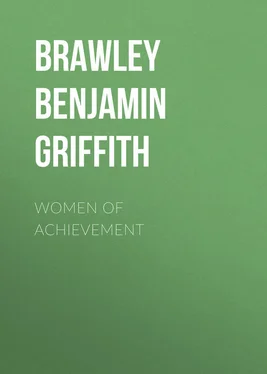Benjamin Brawley - Women of Achievement
Здесь есть возможность читать онлайн «Benjamin Brawley - Women of Achievement» — ознакомительный отрывок электронной книги совершенно бесплатно, а после прочтения отрывка купить полную версию. В некоторых случаях можно слушать аудио, скачать через торрент в формате fb2 и присутствует краткое содержание. ISBN: , Жанр: foreign_antique, foreign_prose, Биографии и Мемуары, foreign_language, на английском языке. Описание произведения, (предисловие) а так же отзывы посетителей доступны на портале библиотеки ЛибКат.
- Название:Women of Achievement
- Автор:
- Жанр:
- Год:неизвестен
- ISBN:http://www.gutenberg.org/ebooks/38783
- Рейтинг книги:3 / 5. Голосов: 1
-
Избранное:Добавить в избранное
- Отзывы:
-
Ваша оценка:
- 60
- 1
- 2
- 3
- 4
- 5
Women of Achievement: краткое содержание, описание и аннотация
Предлагаем к чтению аннотацию, описание, краткое содержание или предисловие (зависит от того, что написал сам автор книги «Women of Achievement»). Если вы не нашли необходимую информацию о книге — напишите в комментариях, мы постараемся отыскать её.
Women of Achievement — читать онлайн ознакомительный отрывок
Ниже представлен текст книги, разбитый по страницам. Система сохранения места последней прочитанной страницы, позволяет с удобством читать онлайн бесплатно книгу «Women of Achievement», без необходимости каждый раз заново искать на чём Вы остановились. Поставьте закладку, и сможете в любой момент перейти на страницу, на которой закончили чтение.
Интервал:
Закладка:
Women of Achievement / Written for the Fireside Schools
THE FIRESIDE SCHOOLS
The work of the Fireside Schools was begun in 1884 by Joanna P. Moore, who was born in Clarion County, Pennsylvania, September 26, 1832, and who died in Selma, Alabama, April 15, 1916. For fifty years Miss Moore was well known as an earnest worker for the betterment of the Negro people of the South. Beginning in the course of the Civil War, at Island No. 10, in November, 1863, she gave herself untiringly to the work to which she felt called. In 1864 she ministered to a group of people at Helena, Arkansas. In 1868 she went to Lauderdale, Mississippi, to help the Friends in an orphan asylum. While she was at one time left temporarily in charge of the institution cholera broke out, and eleven children died within one week; but she remained at her post until the fury of the plague was abated. She spent nine years in the vicinity of New Orleans, reading the Bible to those who could not read, writing letters in search of lost ones, and especially caring for the helpless old women that she met. In 1877 the Woman's American Baptist Home Mission Society gave her its first commission.
The object of the Fireside Schools is to secure the daily prayerful study of God's word by having this read to parents and children together; to teach parents and children, husbands and wives, their respective duties one to another; to supply homes with good reading matter; and also to inculcate temperance, industry, neighborly helpfulness, and greater attention to the work of the church. The publication of Hope , the organ of the Fireside Schools, was begun in 1885. Closely associated with the Schools are the Bible Bands, a single band consisting of any two or three people in the same church or neighborhood who meet to review the lessons in Hope and to report and plan Christian work. All the activities are under the general supervision of the Woman's American Baptist Home Mission Society, though the special Fireside School headquarters are at 612 Gay Street, Nashville, Tennessee. The present work is dedicated to the memory of Joanna P. Moore, and to the wives and mothers and sisters, now happily numbered by the thousands, who are engaged in the work of the Fireside Schools.
I.
INTRODUCTION.
The Negro Woman in American Life
In the history of the Negro race in America no more heroic work has been done than that performed by the Negro woman. The great responsibilities of life have naturally drifted to the men; but who can measure the patience, the love, the self-sacrifice of those who in a more humble way have labored for their people and even in the midst of war striven most earnestly to keep the home-fires burning? Even before emancipation a strong character had made herself felt in more than one community; and to-day, whether in public life, social service, education, missions, business, literature, music, or even the professions and scholarship, the Negro woman is making her way and reflecting credit upon a race that for so many years now has been struggling to the light.
It was but natural that those should first become known who were interested in the uplift of the race. If we except such an unusual and specially gifted spirit as Phillis Wheatley, we shall find that those who most impressed the American public before the Civil War were the ones who best identified themselves with the general struggle for freedom. Outstanding was the famous lecturer, Sojourner Truth. This remarkable woman was born of slave parents in the state of New York about 1798. She recalled vividly in her later years the cold, damp cellar-room in which slept the slaves of the family to which she belonged, and where she was taught by her mother to repeat the Lord's Prayer and to trust God at all times. When in the course of the process of gradual emancipation in New York she became legally free in 1827, her master refused to comply with the law. She left, but was pursued and found. Rather than have her go back, however, a friend paid for her services for the rest of the year. Then there came an evening when, searching for one of her children that had been stolen and sold, she found herself without a resting-place for the night. A Quaker family, however, gave her lodging. Afterwards she went to New York City, joined a Methodist church, and worked hard to improve her condition. Later, having decided to leave New York for a lecture tour through the East, she made a small bundle of her belongings and informed a friend that her name was no longer Isabella , as she had been known, but Sojourner . Afterwards, as she herself said, finding that she needed two names she adopted Truth , because it was intended that she should declare the truth to the people. She went on her way, lecturing to people wherever she found them assembled and being entertained in many aristocratic homes. She was entirely untaught in the schools, but tall and of commanding presence, original, witty, and always suggestive. The stories told about her are numberless; but she was ever moved by an abiding trust in God, and she counted among her friends many of the most distinguished Americans of her time. By her tact and her gift of song she kept down ridicule, and by her fervor and faith she won many friends for the anti-slavery cause.
It was impossible of course for any single woman to carry on the tradition of such a character as Sojourner Truth. She belonged to a distinct epoch in the country's history, one in which the rights of the Negro and the rights of woman in general were frequently discussed on the same platform; and she passed – so far as her greatest influence was concerned – with her epoch. In more recent years those women who have represented the race before the larger public have been persons of more training and culture, though it has been practically impossible for any one to equal the native force and wit of Sojourner Truth. Outstanding in recent years have been Mrs. Booker T. Washington and Mrs. Mary Church Terrell. The spread of culture, however, and the general force of the social emphasis have more and more led those who were interested in social betterment to come together so that there might be the greater effect from united effort. Thus we have had developing in almost all of our cities and towns various clubs working for the good of the race, whether the immediate aim was literary culture, an orphanage, an old folks' home, the protection of working girls, or something else similarly noble. Prominent among the pioneers in such work were Mrs. Josephine St. Pierre Ruffin, of Boston, and Mrs. John T. Cook, of Washington, D. C. No one can record exactly how much has been accomplished by these organizations; in fact, the clubs range all the way in effectiveness from one that is a dominating force in its town to one that is struggling to get started. The result of the work, however, would in any case sum up with an astonishing total. A report from Illinois, fairly representative of the stronger work, mentioned the following activities: "The Cairo hospital, fostered and under the supervision of the Yates Club of Cairo; the Anna Field Home for Girls, Peoria; Lincoln Old Folks' and Orphans' Home, founded by Mrs. Eva Monroe and assisted by the Women's Club of Springfield; the Home for Aged and Infirm Colored People, Chicago, founded by Mrs. Gabrella Smith and others; the Amanda Smith Orphans' Home, Harvey; the Phillis Wheatley Home for Wage-Earning Girls, of Chicago." In Alabama the State Federation of Colored Women's Clubs has established and is supporting a reformatory at Mt. Meigs for Negro boys, and the women are very enthusiastic about the work. A beautiful and well ordered home for Negro girls was established a few years ago in Virginia. Of the White Rose Mission of New York we are told that it "has done much good. A large number of needy ones have found shelter within its doors and have been able to secure work of all kinds. This club has a committee to meet the incoming steamers from the South and see that young women entering the city as strangers are directed to proper homes." All such work is touching in its tenderness and effectiveness. The National Association of Colored Women's Clubs was founded in 1896. The organization has become stronger and stronger until it is now a powerful and effective one with hundreds of members. One of its recent activities has been the purchase of the home of Frederick Douglass at Anacostia, D. C.
Читать дальшеИнтервал:
Закладка:
Похожие книги на «Women of Achievement»
Представляем Вашему вниманию похожие книги на «Women of Achievement» списком для выбора. Мы отобрали схожую по названию и смыслу литературу в надежде предоставить читателям больше вариантов отыскать новые, интересные, ещё непрочитанные произведения.
Обсуждение, отзывы о книге «Women of Achievement» и просто собственные мнения читателей. Оставьте ваши комментарии, напишите, что Вы думаете о произведении, его смысле или главных героях. Укажите что конкретно понравилось, а что нет, и почему Вы так считаете.









![Benjamin Franklin - Memoirs of Benjamin Franklin; Written by Himself. [Vol. 2 of 2]](/books/747975/benjamin-franklin-memoirs-of-benjamin-franklin-wr-thumb.webp)
![Benjamin Franklin - Memoirs of Benjamin Franklin; Written by Himself. [Vol. 1 of 2]](/books/748053/benjamin-franklin-memoirs-of-benjamin-franklin-wr-thumb.webp)

